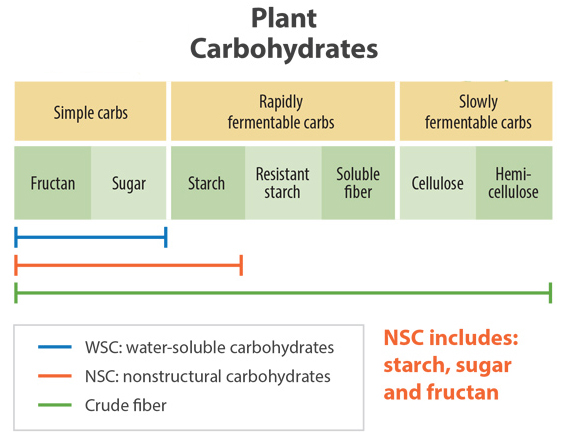Hay Management for Horses with Equine Metabolic Syndrome (EMS) and Cushing’s Disease (PPID)
Click here to download a print version of this infographic.
Text-only version of “Hay Management for Horses with Equine Metabolic Syndrome (EMS) and Cushing’s Disease (PPID)”
NSC levels in the diet are important to know for horses with EMS/PPID.
NSC = Nonstructural Carbohydrates
NSC is present in forages that supply fiber in the horse’s diet.

Normal horses can tolerate NSC levels of 20% or higher. 10% NSC is the optimal level for horses with PPID or EMS. You can’t tell the NSC by looking at hay; you must get it tested.
Typical grass hays can range from 8% to 18% NSC.
There are also several specialized hay chaff or hay cube products on the market that meet the NSC requirements for EMS/PPID horses.
Soaking hay:
- Soak hay that is above 10% NSC to reduce sugar content.
- Completely submerge hay for 60 minutes in cold water, or 30 minutes in hot water.
- Drain well before feeding.
- Soaking should only be used as a stopgap method until a more appropriate hay can be found.
- Soaking also decreases the amount of minerals and calories the hay provides.
To encourage weight loss in overweight horses:
- Over a 30-day period, cut back on daily forage intake until you are feeding 1.25% of ideal body weight per day.
- Never feed less than 1% of ideal body weight per day of hay, as this is unhealthy.
- Once ideal weight is attained, increase daily level of hay fed to between 1.5% and 2% of ideal body weight.
Provide Adequate Vitamin and Mineral Nutrition
Skip the handful of grain and instead offer 2 to 4 ounces of Micro-Phase™ along with your hay.
Micro-Phase is designed to provide the nutrients missing from hay, ensuring your horse gets the nutrition he or she needs without the unnecessary calories.
To learn more about the factors that affect NSC levels in hay, search for NSC in any search box at KPPusa.com.





1 Comment
Thank you for all this information. I have been dealing with ems and ppid for over 10 years in my quarter horse Cubby. He was a “free horse” and I love him more than myself! He was real bad last winter and I didn’t think he was going to survive but my vet recommended insulin wiser and it has really made a difference in his health.
He gets alot of extra vitamins and equinety and msm and it’s so damn expensive but I don’t want to change anything.